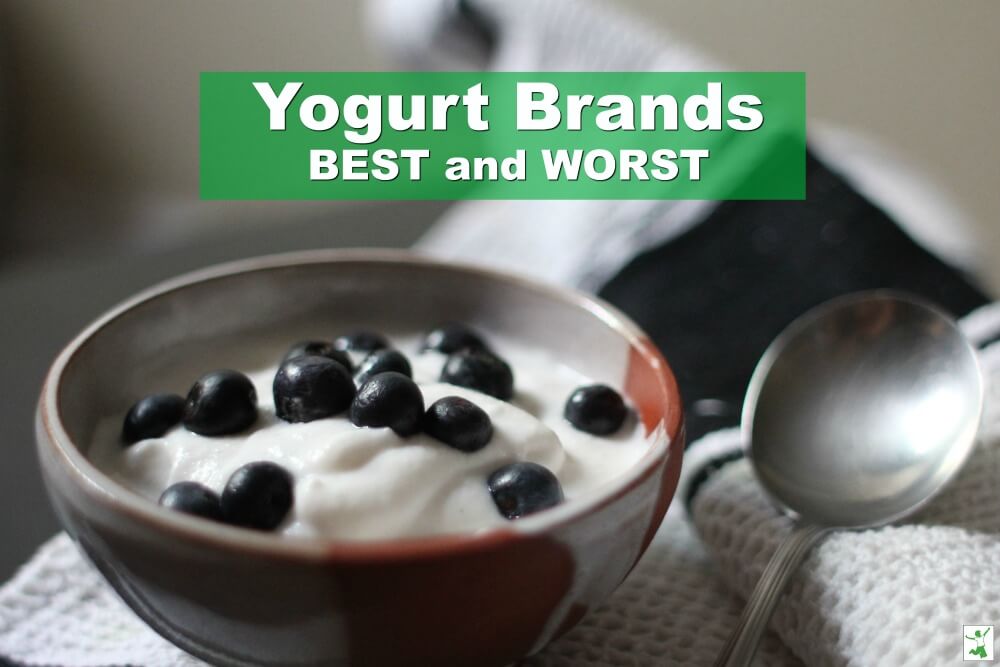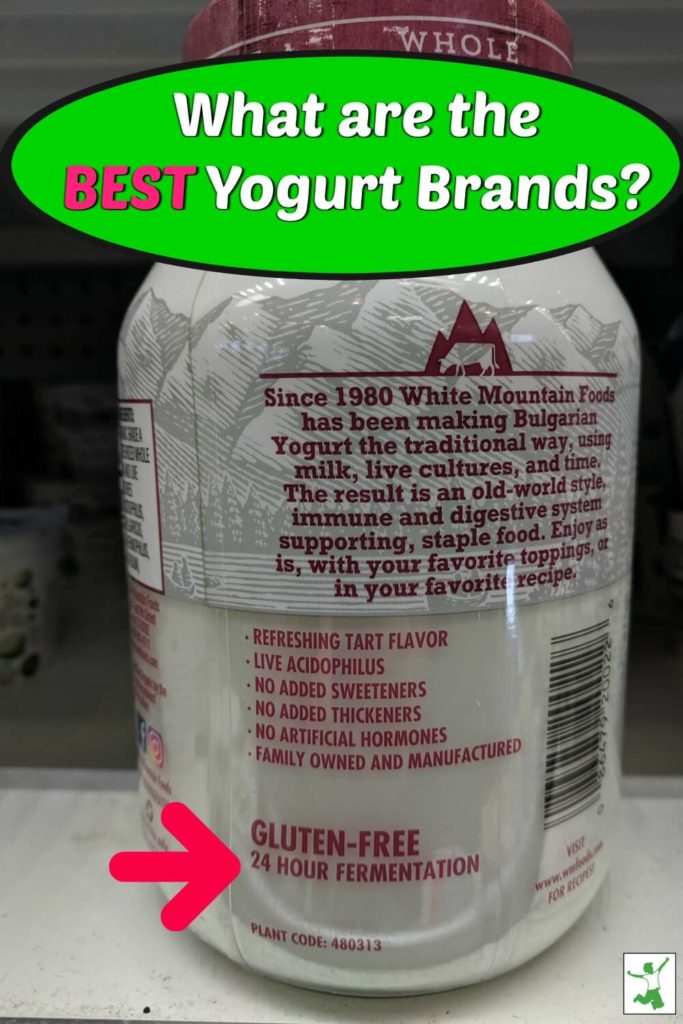How to determine the best yogurt brands available in your area and if they are probiotically equivalent to making yogurt yourself at home.

When I travel, I rely on the convenient accessibility of commercial yogurt brands as my go-to breakfast source. I suspect some of you traditional foodies do too!
Staying satiated with steady blood sugar from healthy fats while on the road is absolutely crucial to avoid the otherwise inevitable slide down the carb and sugar fest rabbit hole.
The question is…which brands of yogurt are best? Which are to be avoided?
There are so many after all! Dozens in fact.
You might be surprised to learn that quality varies greatly from brand to brand, even for organic or grass-fed (pasture-based) yogurt sources.
With that, let’s do a deep dive on the yogurt brands on the market and rank them from worst to best since many of us need to buy a container once in a while even if we prefer to make it ourselves.
Nonorganic Yogurt Brands (Worst)
Right out of the gate, let me suggest that you avoid all brands of nonorganic yogurt or nonorganic brands not certified by the nonGMO Project.
These yogurt sources are considered the worst of the worst.
Not only is this type of yogurt not even made properly, but the milk source is unhappy, confined cows with no access to green grass or sunshine. They live horrifically short, abused lives in most cases.
These sad herbivores consume a mix of genetically modified grain and soy that are Roundup-Ready, aka sprayed heavily with glyphosate-based herbicides.
Even worse, the cows are treated with antibiotics and potentially injected with synthetic bovine growth hormone rbST to boost milk production.
These residues would likely end up in the milk and any product made with it.
Stay away.
Brands of Organic Yogurt
With that point hopefully driven home loud and clear, let’s move on to yogurt brands made with better quality milk.
This would include brands that are organic, grass-fed, and/or utilize milk certified by the nonGMO Project.
This type of labeling ensures that yogurt made from this milk would contain little to no glyphosate herbicide residue.
It would also safeguard as much as is humanly possible (in this polluted world) against milk containing synthetic hormones, antibiotics, and pesticide residues.
Even when you filter for these top of the line brands, there is still quite a bit of variation in quality.
Let me explain further.
Artificial Thickeners
One of the most delectable aspects of yogurt is its thick, spoonable texture.
Unfortunately, even when a brand of yogurt is certified organic, additives may be used to achieve this consistency artificially!
Sad but true…USDA certified organic yogurt sometimes contains thickeners to mimic the texture of the real thing.
For example, Stonyfield adds pectin as a thickener to its yogurt. Here are the ingredients in its whole milk organic, pasture raised, nonGMO Project certified yogurt: (1)
Cultured Pasteurized Organic Whole Milk, Pectin, Vitamin D3
I also don’t like the addition of Vitamin D3. Personally, I don’t buy fortified products. To me, it’s a clear sign of poor quality no matter what the certifications.
100% grass-fed organic brands like Maple Hill use this trick too. Here are the ingredients of their blended organic whole milk yogurt (the word “blended” does not appear on the label, by the way): (2)
Organic whole milk, organic nonfat milk, organic tapioca starch, fruit pectin, live and active cultures
So, not only is this product not actually whole milk yogurt (despite the labeling), but it shockingly contains added starch as well as pectin to artificially thicken.
Watch out keto dieters! Many of you may be eating this stuff with absolutely no idea that it contains starch!
Note that the unsweetened, “cream on top” Maple Hill whole milk plain yogurt and the Greek style plain yogurt contain only organic milk and live cultures. No pectin or starch is added to these offerings, which is good. (3)
Thus, even within a single brand of organic yogurt, there is a significant variation in the quality of the products on offer. You must check the ingredients to be sure you are getting what you think you are getting!
24 Hour Yogurt
Once you’ve found an organic (or nonGMO Project verified), grass-fed yogurt that contains only milk and live cultures, you might think you’ve identified a good brand.
I would suggest that you still need to look further.
You see, another common commercial practice with even the best yogurt brands is to shorten fermentation time to save money and boost profits.
Properly made yogurt is fermented for a full 24 hours. This ensures three things:
- Natural thickness with no need for additives.
- Maximum strength of live cultures.
- Significant reduction of milk sugar (lactose). In other words, low carb yogurt without the need for straining out the whey a la Greek style.
Anyone who has made yogurt at home knows this already!
However, since most people don’t make their own yogurt, they are easily fooled when buying.
Fermentation Time of Store Brands
At this point, you might be thinking about how you could possibly tell how long a particular brand of yogurt was fermented without the inconvenience of calling the company and quizzing customer service (who probably doesn’t know anyway).
It’s easier than you might think!
What you do is simply check the nutritional label to see what the sugar content is.
24-hour yogurt will have very little lactose left after fermentation.
Hence, if a brand of yogurt contains about the same grams of lactose as the equivalent amount of plain milk, that is a clue that it was not fermented properly.
Let’s go back to Stonyfield Organic yogurt as an example. One cup of their whole milk organic yogurt contains 11 grams of lactose milk sugar. (4)
This is virtually the same as a glass of whole milk! How can this be? (5)
Fake Yogurt Contains as Much Lactose as Milk
Elaine Gottschall, author of Breaking the Vicious Cycle and creator of the gut healing Specific Carbohydrate (SCD) diet knew about these industrialized yogurt manufacturing techniques. Here’s what she had to say on the subject: (6)
According to Dept. of Agriculture dogma, additional milk solids including lactose and protein are added to commercial yoghurt and then subjected to the short fermentation. Because of so much lactose in it from the very beginning, what happens is that the little good guys (bulgaricus and thermophilus start doing their work and when they have converted half of the lactose in the original vat, there is lactic acid produced and the acidity (acid=acidity)(the pH) reaches a critical point of about 3.5. At this point, our little guys’ enzymes cannot work because of the acidity and there is still 50% more lactose remaining (remember they added milk solids at the start). You end up with as much, if not more, lactose as in a glass of milk. Subjecting the yoghurt to more time would not change anything. The cultures’ machinery (enzymes) cannot work in such an acid environment.
Not all brands of organic yogurt pull this stunt, however. Let’s look at another example.
Yogurt with Less Lactose than Milk
Let’s look at Maple Hill’s unsweetened, cream top whole milk yogurt again. One cup, containing only milk and live cultures, contains 9 grams of lactose milk sugar. (7)
This is slightly less than the 11 grams of lactose in a cup of whole milk. (8)
On the positive side, because the lactose in the yogurt is less than the amount in the equivalent amount of milk, you know that this brand probably did not add additional lactose prior to fermentation. This is a very good sign.
However, the lactose in the yogurt is not significantly lower than in the equivalent amount of milk. Thus, even this brand of yogurt is not considered “best” because the fermentation time was not long enough.
What about Greek?
One way to solve the problem of high amounts of lactose in commercial yogurt brands is to simply buy Greek yogurt.
The excess lactose that remains due to improper fermentation methods is largely removed through straining out much of the liquid whey.
However, you are still left with a product that does not have sufficient probiotic strength.
But, at least the milk sugar is in line with levels in raw yogurt and slow cooker or crockpot yogurt.
Bulgarian Yogurt
There are currently only a couple of brands of yogurt on the market that I’ve found that checks all the boxes for properly fermented yogurt made from high-quality milk.
This is Bulgarian yogurt. (9)
While the name “Bulgarian yogurt” is a bit of a misnomer (virtually all commercial yogurt contains the Bulgarian strain Lactobacillus bulgaricus), it does offer the following characteristics which no other brand I’ve examined (so far) can match.
- Organic, unhomogenized milk preferably from pastured cows
- Fermented for a full 24 hours, maximizing probiotic content
- Extremely low levels of lactose, that is low carb without the need for straining.
- Packaged in glass (better taste, more environmentally responsible since little plastic actually gets recycled even when placed in recycling bins)
Good Brands to Consider
For those of you who would like a simple list of acceptable brands of yogurt made from nonhomogenized grassfed milk, these are excellent to consider:
- White Mountain (24 hour yogurt)
- Seven Stars
- St. Benoit Creamery (24 hour yogurt)
- Bellwether Farms
- Old Chatham
There are certainly a few others I don’t know about that are available regionally that would make this list.
Use the tips above to vet the ones in your area especially when substituting yogurt for fresh whole milk to make the best homemade baby formula.
References
(1, 4) Stonyfield Yogurt
(2, 3, 7) Maple Hill Whole Milk Yogurt
(5, 8) Maple Hill Whole Milk
(6) Breaking the Vicious Cycle FAQ
(9) Bulgarian Yogurt









Did you check out Kalona yogurt? I’ve liked their butter, cottage cheese and whipping cream, but I did see in the yogurt ingredient list, #2, added non-fat milk after whole milk.
The White Mtn Bulgarian yogurt is too sour for my liking.
Thanks
Hi, I think the Vitaclay yogurt maker is being discontinued. . .
Do you have any other makers that you recommend? I started looking into the Luvele brand.
It appears to tick all the boxes. Low temp, glass container, 24 hour fermentation, , , but it uses a water bath. Any insight you could share would be much appreciated
I have made several yogurts of different strains and milks with the Luvele. It is the BEST! Easy to use. Worth the cost.